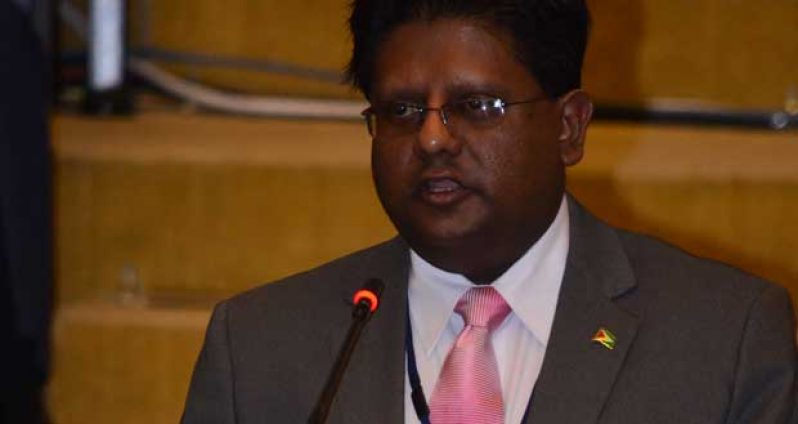– calls for removal of impediments affecting integration, trade relations within Caribbean
THE need to work more urgently and concertedly to restore faith in regionalism, pride in regional identity, and enthusiasm for the regional enterprise was yesterday underscored by Guyana’s Finance Minister and Chairman of the Caribbean Development Bank’s (CDB) Board of Governors, Dr. Ashni Singh.Speaking at the opening of the 44th Annual CBD Board of Governors Meeting, held in the Guyana International Conference Centre (GICC), Dr Singh explained that the region has registered mixed economic performances in the last few decades, and there has to be renewed haste to remove all impediments to factor mobility across and within a truly single regional space.
ECONOMIC CHALLENGES
Dr. Singh said: “Our exposure to the forces of nature has been amply illustrated, over the years, with increasingly volatile, unpredictable, and intense weather along with rising sea levels, combining to threaten our very existence in some cases, and our entire infrastructural and productive base in others.
“…at the same time, our exposure to the increasingly unpredictable external environment is stark, with the global and hemispheric economy (being) more integrated and interconnected than at any previous time in history.
“The risks arising from low and unpredictable external demand for service products such as our tourism, and volatile imported and exported commodity prices, along with contracting foreign direct investment, official development assistance, and Diasporic remittances, conspire to create conditions of extreme unhelpfulness.
“…(all of this has) brought into sharper focus the problematic under-diversification and mono-sectoral dominance persistent in so many of our economies. The result has been retarded growth, fiscal stress, and unsustainable debt.”
He consequently stressed the need for a single-minded focus on the long established priority projects that have been identified, if a more competitive regional economy is to be achieved in this generation.
Dr Singh asked rhetorically: “What must we do now to ensure that the vulnerable small states of the Caribbean become – or as the case might be, remain — a viable entity; and beyond viability, to ensure that (they) achieve the real and lasting prosperity that (their) people have anxiously awaited for such a long time?
“This is the question that must preoccupy the minds and efforts of the intellectual and political leadership of the region, and to which an answer is urgently needed.
“…we address our minds to finding the answer to that admittedly sweeping and long-vexing question; there are certain evident realities that demand immediate action.”
FADING CONVICTIONS
Dr Singh thinks the peoples of the region have been experiencing a fading of conviction on the validity of the single Caribbean identity and the value of Caribbean oneness.
He said: “Regionalist fervour is being supplanted by parochialist caution, openness by inwardness, competition by protectionism, and ideological passion by myopic opportunism.
“We in the region seem to be happier contesting against and amongst each other, (rather) than contesting together against the rest of the world.
“Whether the latter is a sign of our times or the zone of greater comfort for us, the inevitable consequence is suboptimal productivity and competitiveness; and the unavoidable victim is the Caribbean citizen, no matter how unbeknownst to him for the time being.”
Dr. Singh maintained that there is no more effective way to achieve the restoration of faith in regionalism, pride in regional identity, and enthusiasm for the regional enterprise than through demonstration of practical successes in the integration effort.
“We need to work more urgently and concertedly to restore faith in regionalism, pride in regional identity, and enthusiasm for the regional enterprise” – Dr. Ashni Singh
“The question for us is whether we wish just to be the latest generation engaging in lamentation of current challenges, or whether we would like to be known instead for being a generation that found valid and lasting answers when asked the inextricably intertwined questions,” he said.
Dr Singh pointed out that successes have been made, and these must be consolidated and further advanced.
“Today, our countries are represented in the councils of the United Nations; we occupy pride of place amongst the global family of democracies; our flags flutter over the medal podiums of the Olympic Games, albeit not as frequently as we might wish; and some aspects of our cultures, like the music we make and the food we eat, have finally started to enjoy a measure of nationality-based brand recognition,” he said.
Going forward, the areas for cooperation, priority projects, as highlighted by Dr. Singh, included:
* The reduction of vulnerability to climate change;
* The achievement of greater food security in the region;
* The achievement of greater energy security, especially by harnessing clean and renewable sources;
* Resolving critical gaps in transport and communications infrastructure; and addressing legislative, regulatory, and institutional impediments to intra-regional trade.
“Single-minded focus must be placed on these long established priority projects if a more competitive regional economy is to be achieved in this generation,” Dr Singh stressed.
The Caribbean Development Bank is a regional financial institution established in 1970 for the purpose of contributing to the harmonious economic growth and development of the member countries in the Caribbean.
There are nineteen regional borrowing member countries, three regional non-borrowing member countries and five non-regional, non-borrowing member countries.
(By Vanessa Narine)



.jpg)








